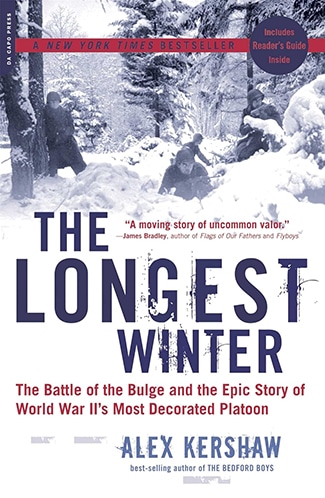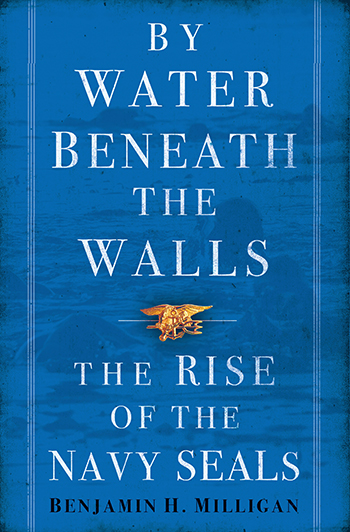S10 Ep 366 David goes bunker hunting with WW2 historian Andrew Chatterton

Explore "military_history" with insightful episodes like "S10 Ep 366 David goes bunker hunting with WW2 historian Andrew Chatterton", "Culture chat: ‘Napoleon’ with historian Simon Schama", "Duty, Honor, and the Unlikely Heroes Who Helped Win the Battle of the Bulge", "Part Two: Oskar Dirlwanger: The Worst Nazi" and "Why Do the Navy’s Frogmen Fight on Land?" from podcasts like ""Chatabix", "FT News Briefing", "The Art of Manliness", "Behind the Bastards" and "The Art of Manliness"" and more!


Historian Sir Simon Schama and FT deputy arts editor and film expert Raph Abraham join Lilah to discuss the historical epic ‘Napoleon’. Ridley Scott’s new two-and-a-half-hour-long film stars Joaquin Phoenix, and documents a lot: Napoleon’s rise and fall, some of his most famous battles, and his relationship with his wife, Josephine. But how well does it represent his character? We discuss what the film got right and wrong (historically and dramatically), why Napoleon continues to loom so large in culture, and whether historical epics still satisfy us.
-------
We are still collecting your cultural predictions for 2024! What’s one thing you think will happen (or want to happen) in culture next year? Write us. You can email us at lifeandart@ft.com or message Lilah on Instagram @lilahrap.
-------
Links (all FT links get you past the paywall):
– Simon’s FT Weekend essay on Napoleon, and why so many writers and filmmakers try to depict him: https://on.ft.com/4861gbn
– the FT’s official review of Napoleon by Danny Leigh: https://on.ft.com/484moPh
– An essay from Janan Ganesh on why Napoleon still matters: https://on.ft.com/3uWF8Sj
– Simon recommends the 2012 movie ‘Lincoln’, directed by Steven Spielberg
– Raph is a fan of Pablo Larrain’s ‘Jackie,’ from 2016, and the Leonard Bernstein biopic ‘Maestro’, directed by Bradley Cooper and available on Netflix on December 20
– We interviewed Pablo Larrain in 2021 about his creative process: https://on.ft.com/3oofjVO
– Lilah wrote a column about learning to draw: https://on.ft.com/46NBaZt
– Simon is on X @simon_schama
-------
Special FT subscription offers for Life and Art podcast listeners, from 50% off a digital subscription to a $1/£1/€1 trial, are here: http://ft.com/lifeandart
-------
Original music by Metaphor Music. Mixing and sound design by Breen Turner.
Read a transcript of this episode on FT.com
Hosted on Acast. See acast.com/privacy for more information.

The Battle of the Bulge commenced on the morning of December 16, 1944. The Allies were ill-prepared for this last, desperate offensive from the Germans, and the campaign might have succeeded if a few things hadn’t gotten in their way, including a single, green, 18-man platoon who refused to give up their ground to the Nazis.
Alex Kershaw shares the story of these men in his book, The Longest Winter, and with us today on the show. He first explains the background of the Battle of the Bulge and how an Intelligence and Reconnaissance unit that had never seen combat ended up in the thick of it. And he describes the platoon’s 20-year-old leader, Lyle Bouk, who was determined to carry out his orders and hold their position despite being massively outmanned and outgunned, and how his men fought until they were down to their last rounds. Alex then shares how what Bouk thought was a total failure — being captured as POWs after just a day of combat — turned out to have been an effort that significantly influenced the outcome of the Battle of the Bulge, and how an unlikely platoon of heroes who initially went unrecognized for their valor became the most decorated American platoon of WWII. You’ll find such an inspiring lesson in this show about living up to your duty and holding the line.


Robert is joined again by Matt Lieb to continue to discuss Oskar Dirlwanger.
See omnystudio.com/listener for privacy information.

When you think of the Navy SEALs, you think of elite special operators who have been tasked with commando-type missions in conflict zones from Central Africa to Afghanistan. Which raises a question you may never have thought about, but seems quite obvious and interesting once you do: "Wait, why are members of the Navy, a waterborne military force, operating hundreds of miles from the nearest ocean?"
This question spurred my guest, a former Navy SEAL himself, to explore the answer in his book By Water Beneath the Walls: The Rise of the Navy SEALs. His name is Benjamin Milligan and today we discuss the history that explains why the Navy became the branch of the military that supplied this famous go-anywhere force, and how men who started out as sailors became involved in land-based operations. Ben details the predecessors of the SEALs which took the form of various commando-type units that the Army and Marines experimented with and scuttled, and how the Navy, which had played a supporting role in these units, ended up being the one to continue to develop them. We discuss how the naval combat demolition units (NCDUs) and underwater demolition teams (UDTs) birthed during WWII would ultimately lead to the creation of the Navy's frogmen as we know them today. Along the way, Ben shares details of the unique characters who shaped the unit's trajectory, including the surprisingly bookish commander who created the most legendary part of the SEALs' training: Hell Week.


The incredible, heartbreaking story of the antifascist struggle in Spain.
Learn more about your ad-choices at https://www.iheartpodcastnetwork.com
See omnystudio.com/listener for privacy information.

This week marks the 75th anniversary of the D-Day landings at Normandy. This amphibious Allied effort comprised a joint effort between British, Canadian, and American troops. Operation Overlord was massive in scope, and required effectively launching 12,000 planes and 7,000 vessels, landing 24,000 paratroopers into enemy territory, and transporting 160,000 troops across the English Channel and onto and over 50 miles of beaches.
To commemorate this epic operation, I talk to historian Alex Kershaw about his latest book, The First Wave: The D-Day Warriors Who Led the Way to Victory in World War II. We begin our conversation with the context of the invasion and how the plans for it began years before 1944. Alex then walks us through the pre-dawn missions that paved the way for the larger invasion in the morning and how perilously close these first missions came to failing. Along the way he tells the stories of individual men who took part in this sweeping operation, including Frank Lillyman, the first paratrooper to land in Normandy; Theodore Roosevelt, Jr., a 56-year-old general and son of President Theodore Roosevelt; and Lord Lovat, a Scottish commando who brought along his personal bagpiper to pipe the British commandos ashore on D-Day. Alex and I discuss why only four Medals of Honor and one Victoria Cross were awarded on D-Day, despite the high number of heroic acts performed that day by ordinary men placed in an extraordinary circumstances. We end our conversation discussing the legacy of D-Day three-fourths of a century later.
Get the show notes at aom.is/dday.

For thousands of years, the Spartans have captured the imaginations of Westerners. In ancient Greece, the city-state was admired for its military prowess, civic unity, and dedication to leisurely athletic pursuits. Today, we make movies about Spartans and name sports teams after them. When we moderns think of Spartans, we typically think of them simply as fierce warriors.
But while the Spartans were indeed warriors par excellence, their culture was much more complex. Today on the show, I unpack some of these complexities with historian Paul Rahe. Paul is working on a series of books with Yale University Press which explore both the military and political strategy of the Spartans. We begin our conversation discussing why it’s hard for us moderns to truly understand Sparta. We then dig into the history and culture of Spartans, including where they came from, their economic set-up and relationship with the helot population, and the strenuous upbringing of boys that made them fit for battle. We then talk about the mixed government of the Spartans. We end our conversation discussing how the city-state faded into obscurity, and why the Spartans yet live on in modern culture.
Get the show notes at aom.is/sparta.

In World War II, a secret department of British 'corkscrew thinkers' hatched a plan to use the cadaver of an unclaimed homeless man to turn the tide of the war in the Allies' favor. It worked.
Learn more about your ad-choices at https://www.iheartpodcastnetwork.com
See omnystudio.com/listener for privacy information.
Stay up to date
For any inquiries, please email us at hello@podcastworld.io